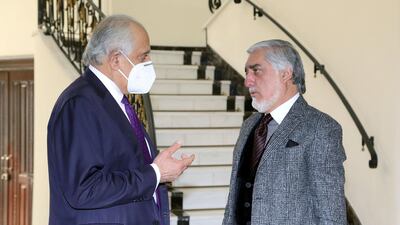US envoy for Afghanistan Zalmay Khalilzad called for "tangible progress" towards peace after arriving in Doha for the resumption of talks between the Afghan government and the Taliban.
Since the intra-Afghan talks began in September in the Qatari capital, where the Taliban have a political office, violence has increased across Afghanistan. Journalists and activists have been killed, dozens of students were killed in an attack at Kabul University and Taliban insurgents attempted to capture the cities of Lashkar Gah and Kandahar.
"I return to Doha and the region with expectations that the parties will make tangible progress in the next round of Afghanistan peace negotiations," Mr Khalilzad said.
"The current levels of violence, including targeted killings, is unacceptable.
“Both sides must demonstrate they are acting in the best interests of the Afghan people by making real compromises and negotiating an agreement on a political settlement as soon as possible and an immediate significant reduction in violence/ceasefire.”
Since being appointed by US President Donald Trump in late 2018, Mr Khalilzad led Washington's effort to end the nearly two decades of conflict in Afghanistan after the 2001 US-led invasion.
Mr Trump, who leaves office in two weeks, has long voiced his support for the withdrawal of American troops from Afghanistan.
Under a deal signed with the Taliban in February last year, the US agreed to take its forces out of the country by May in exchange for counterterrorism assurances from the insurgents.
This month the US plans to reduce its military presence by about 2,000 troops, taking its force to 4,500, who are provide support to Afghan forces.
After a break of almost a month, the second round of talks "will be lengthier and more important", Ahmad Saeedi, a former Afghan diplomat in Pakistan who is now an independent political analyst in Kabul, told Bloomberg.
The two sides will also negotiate the structure of a future Afghan government, in addition to the ceasefire.
"We'll discuss the most important agenda – the violence reduction or a comprehensive ceasefire," said Ghulam Farooq Majrooh, a member of the government's negotiating team.
The killings of journalists and activists will also be on the agenda, he said.
The Taliban "are interested in establishing an interim government", Abdul Hafiz Mansour, another member of the Afghan negotiating team, said on Sunday.
However, Afghan President Ashraf Ghani said that would reverse the hard-won achievements in areas such as human rights made in the past two decades.
Since November, journalists across the country have been targeted by militants.
Bismillah Adil Aimaq was the fifth reported to be killed in the past two months when he was shot in Ghor province on January 1, according to the Afghanistan Journalists Centre.
Elyas Daee from the Afghan branch of US-sponsored Radio Free Europe, Rahmatullah Nikzad from the Associated Press and Al Jazeera, and Malala Maiwand, an anchor on a local TV channel, were among the dead. A further two journalists also died in Kabul from unknown causes.
In an address to the Afghan parliament on Monday, Interior Minister Massoud Andarabi, who was summoned over security failures, blamed the Taliban for the deaths, citing "accurate intelligence evidence and confessions from arrested perpetrators".
The Taliban have repeatedly denied responsibility for the attacks.
The head of National Directorate of Security, the country’s intelligence agency, Ahmad Zia Saraj – who was also summoned to parliament over the violence – told MPs that Taliban insurgents carried out about 18,500 attacks in one year and have no “pure intentions for peace”.

